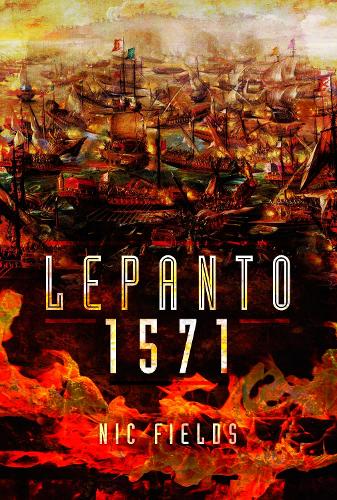
Lepanto 1571: Christian and Muslim Fleets Battle for Control of the Mediterranea.
(Hardback)
Publishing Details
Lepanto 1571: Christian and Muslim Fleets Battle for Control of the Mediterranea.
By (Author) Nic Fields
Pen & Sword Books Ltd
Pen & Sword Maritime
19th October 2020
28th February 2020
United Kingdom
Classifications
General
Non Fiction
Battles / military campaigns
956.9301
Physical Properties
Hardback
224
Width 156mm, Height 234mm
Description
The battle of Lepanto has long been considered one of the decisive naval battles of history. Yet, the savage fighting on Sunday, 7 October 1571 left the strategic map unchanged and the defeated Ottoman Turks were able to replace their losses and launch a new fleet the following year. Nic Fields re-examines the battle and concludes that, while it merely confirmed a strategic reality that had already emerged during the 16th century (i.e. that naval supremacy lay with the Sublime Porte in the eastern Mediterranean, and with Habsburg Spain and its Catholic allies in the western Mediterranean), it's vital importance was psychological. It sank the perception of Ottoman dominance and the inevitability of Islam's westward encroachment beyond the Balkans. With over 200 ships per side, it was the largest naval battle in sixteen centuries and the last major fight between fleets composed entirely of the muscle-driven galley. These slender ships were the direct descendants of the Classical trireme but carried cannon and marines bearing firearms, although massed archery and cold steel still played a major r le on the fateful day. Nic Fields gives an excellent account of this fascinating and spectacular battle. AUTHOR: Dr Nic Fields started his career as a biochemist before joining the Royal Marines. Having left the military, he went back to university and completed his doctorate in Ancient History at the University of Newcastle. He was Assistant Director of the British School at Athens, then a lecturer in Ancient History at the University of Edinburgh. He is now a freelance author and researcher based in southwest France, specialising in ancient military history. 20 colour illustrations
Author Bio
DR NIC FIELDS started his career as a biochemist before joining the Royal Marines. Having left the military, he went back to university and completed his doctorate in Ancient History at the University of Newcastle. He was Assistant Director of the British School at Athens, then a lecturer in Ancient History at the University of Edinburgh. He is now a freelance author and researcher based in southwest France, specializing in ancient military history.
